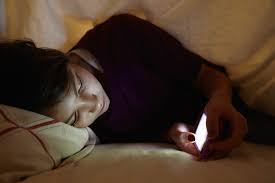
blue light and kids
As a child, I loved reading before bed, but because I shared a room with my sister, I was only allowed to read to a certain hour. Not to be deterred, I read with a flashlight under the covers or read on the bathroom floor. I was addicted to reading books. Today’s teens, like many adults, have a much bigger addiction and that is to their phones.
Preparing your child for a new school year can be a good time for implementing a new regimen.
According to a poll conducted by the National Sleep Foundation, parents reported sleep quality was better among children age 6 to 17 who always turned their devices off at night. Forty-five percent of kids were described as having excellent sleep quality versus 25 percent of those who sometimes left devices on.
Many studies have demonstrated that light given off by electronics affects our sleep. The consensus is that the blue light (artificial illumination) that LED screens give off inhibits the production of melatonin, the hormone that signals our brain that it’s time for bed. The lights come from not only phones but computer screens and tablets. Then there is also the issue of the content kids are looking at before bed. An eighth grade girl recently told me she has a hard time going to sleep after reading certain news articles on her phone or seeing a show that upsets her. But because her phone is her entertainment in the evening, she admits to staring at it until she eventually falls asleep.
Lynette Vernon of Murdoch University in Perth conducted a longitudinal study (repeated observation over long periods) of 1,101 Australian high school students, between the ages of 13 and 16. She found poor-quality sleep, associated with late-night texting or calling, was linked to a decline in mental health, such as depressed moods and declines in self-esteem and coping ability.
Victoria L. Dunckley M.D. states in her article, Screentime Is Making Kids Moody, Crazy and Lazy, “interactive screen time is more likely to cause sleep, mood, and cognitive issues, because it’s more likely to cause hyperarousal and compulsive use.”
Parents who want to curb phone use before bed could have their child place their phone in a designated spot outside the bedroom before retiring for the evening. If parents aren’t comfortable flatly banning their child from phone use after a certain hour, they may find it more agreeable to start a discussion, using current research and facts as to how late night phone use affects them. This may help your child to make their own decision to restrict phone use past a certain hour. Negotiate, if needed, maybe they can keep their phone by their bed but set it to “do not disturb” 30 minutes prior to when they’d like to be asleep so incoming texts do not tempt them to interact.
Because we recognize the importance of a good night’s sleep in our developing young students and know taking something away from a child usually goes better if they have something to replace it with, offer other alternatives. You might suggest they listen to music, write or draw in a journal, or consider buying books that might entice them to read before bed. While reading may be stimulating for some, sleep scientists agree it is still better than being on your phone or computer immediately before retiring for the night.



